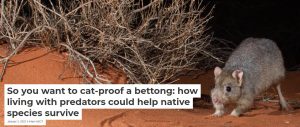In a recent contribution to The Conversation, Associate Professor Katherine Moseby (UNSW) refers to rabbits, cats and foxes as an unholy trinity. Rabbits competed with native mammals for food and became food themselves for cats and foxes – inflating predator numbers and adding to the predation of native mammals.
Katherine has over 25 years of experience in trying to conserve threatened animals and wants to see them survive outside of fenced, feral-free reserves and islands. For the past six years researchers at the Arid Recovery reserve in South Australia have been trying to train bilbies and burrowing bettongs to be more aware and wary of predators through low-level exposure to them. Reducing vulnerability to predators is seen as fundamental to enabling endangered mammals to survive in their former habitat outside of highly managed reserves.
Preliminary results are indicating that cat-exposed bilbies became more wary, sought thicker cover for protection and survived better than ‘non-exposed’ ones. Predator-exposed bettongs became harder to approach and developed faster escape-reactions compared to control animals; but not enough improvement yet to escape predators.
For more information on this potentially game-changing approach, see ‘So you want to cat-proof a bettong‘ by Katherine Moseby in The Conversation, Jan 3, 2022.

The Conversation, Jan 3, 2022. Image: Jannico Kelk
